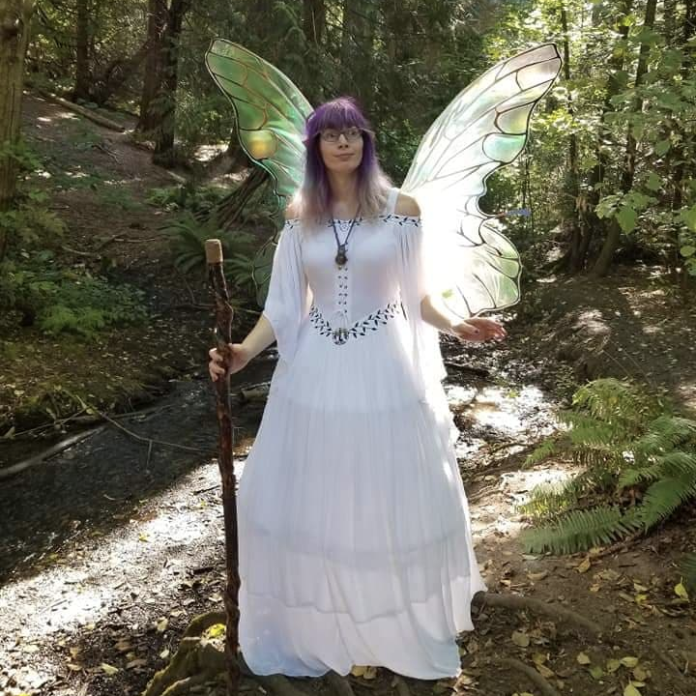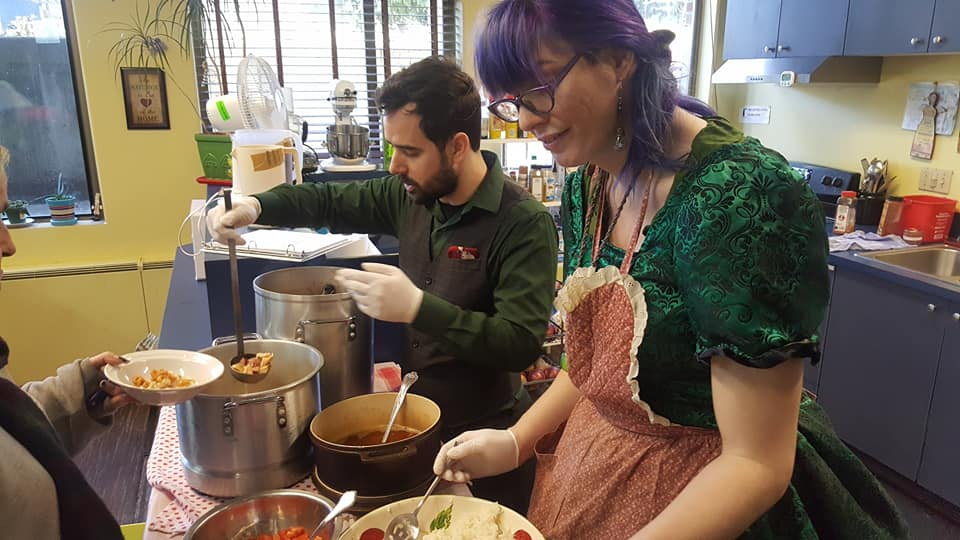
Equality Coalition for Housing and Opportunity (ECHO) is co-hosting an 2SLLGBTQIA+ (Two-Spirit, Lesbian, Gay, Bisexual, Trans, Queer, Intersex, and Asexual) conversation with Share The Cities following a Be:Seattle-led tenant bootcamp on Wednesday, September 9th. Register here. In anticipation of that event, check out this interview with ECHO co-founder Lonness Valenna.
Lonness Valenna is a co-founder of Equality Coalition for Housing and Opportunity (ECHO). She is an active volunteer at shelters, cooking and gathering donations for places like Elizabeth Gregory Home. She is known as the Fairy Godmother, and is a resource for trans and gender-nonconforming people who want to transition into their true selves.
ECHO: What would you consider your biggest successes? What housing security story are you most proud of–what is the biggest impact you have had? (Yes, we are asking you to brag a bit).
Lonness: Well… I have, I guess, three. One was a lady who used to live in our backyard in a tent. She put her name in the lottery in which Washington State will pay your rent for a whole two years and she actually won the lottery. This was after more than five years of being on the list. She’d been living in a tent the whole time.
The sad reality is, that because of her failing health from having to stay outside so long, she lived about two weeks at her new place before passing away due to health complications. So you can get into some (support) through the systems we have, but a lot of times it’s far too late.
Another time, my congresswoman contacted me, at least her aides did, and asked me to help find housing for somebody. This was for a queer person of color, who is also undocumented that was escaping a horrible situation of violence and what-not. I had her stay on my couch for a time.
It took me two weeks, about six to eight hours a day, searching for someplace that she could go. It also had to be where people were comfortable with having her there because of her status. We shouldn’t have that problem. Eventually. I did find someone who lives way in the middle of nowhere to take her in and help her out. Right now, she’s actually doing well. She has her own apartment. She was able to save up enough for an apartment.
A third success. When I first started trying to help out, I helped set up a total of four trans houses scattered around the Puget Sound area. Each one had four to five trans people, (with) some situation or story of homelessness but due to systematic issues that always arise, we had to close down two of them. Now just the one I live in, and Amy’s house, the original one, are left standing. That’s only because of outside help from generous donors. (It’s a mix of) organizations, or just sometimes I have extra money. It’s a shame that that’s what you have to rely on in order to get out (of homelessness). It is who you know. I wish there was more State-led help for homeless people.
ECHO: What policy solutions (even if they are deemed “unrealistic” by current decision makers / elected officials) get you most excited?
Lonness: OK! I get to talk about my bus program that I tried to do a while back.
We took a look at Hawaii, and they’re taking old buses that are being decommissioned by their state run bus fleet and are utilizing them to be places for homeless people. They can mobilize them to where they’re needed most… I was like “This is a brilliant idea!” So, I went to talk to Metro over here in Seattle. Metro said “We’re getting rid of a bunch of buses soon. We can only have them for a certain amount of years and they’re still perfectly good. We will donate them to your nonprofit.”
At the time, I knew people who could reformat these buses and turn them into mobile shelters. So, I started going to a lot of churches and shelter parking lots. I wanted to park overnight and have them hauled to a different location to be cleaned and fixed for the next night, each day. I planned to train people to work on these and upkeep them, so they would be learning a trade, as well. It was a whole win-win situation. We especially wanted people to get out of the cold during the wintertime.
Finally, we made a presentation at Seattle City Hall, and you know what happened two weeks later? The City seemed to change the rules (in response). For example, the number of people for new fire codes for busses and RVs.

I had to go look back and (make changes). Okay, we need to downsize this, we can only have twelve people per bus, instead of thirty; fold down beds, with an outhouse on a small little trailer that’s on the back that people can use. We had everything thought up! The decision makers, after seeing our lovely (ideas), said “There’s nothing we can find wrong with this”.
Another two weeks later, they changed the law stating that a vehicle of a certain length cannot be parked within city limits.
In New Orleans they have removable drive shafts so that they can turn buses into floats for Mardi Gras. (This makes it) legal to have people on it. I took that same design and could incorporate it into the buses and wrote to the city “Hey look now they’re just trailers you can push you can pull and drop and it would still be perfectly legal within your (parameters)”.
Then, King County made a law to stop that!
No matter what creative ways you find, the government leaders found ways to keep pushing the homeless people out. Instead of trying to fix the problems, the City of Seattle would rather do Band-Aids, small things that make them look good in the moment, instead of trying to fix a problem. It would be cheaper to fix the problem.
ECHO: What harm reducing housing “solutions” do you support? (tenant workshops? why or why not?)
Lonness: I personally support a lot of resource gathering and distribution of resources. But when it comes to workshops, I find if it includes the tenants, and not the landlords that are supposed to provide housing at an affordable rate, (landlords) never get to hear from tenants. You can’t just have a meeting of one side and not include the other. If there’s no communication there is no change that can happen. You might as well be talking to a brick wall.
(It would be interesting to see what would happen) here, if such a rule were to be in place. Landlords probably wouldn’t choose to come. That’s why it must be a mandated thing. If this happens, I hate to say it, a lot of people might sell their land. Maybe, then that wealth can go back to the people, it originally started with. Either way, it seems like it would be a win-win situation. I know it’s a radical idea.
The full interview “A Disgruntled Fairy Godmother of Housing” will be available beginning in October at ECHO’s blog. Thanks to Anders McConachie for conducting the interview, Zoe Euster for transcribing it, and Laura Loe for light edits for content and clarity.
Equality Coalition for Housing and Opportunity (ECHO)creates empathy-building and educational programs around homelessness and unemployment in the Puget Sound area’s 2SLGBTQIA+ (Two-Spirit, Lesbian, Gay, Bisexual, Trans, Queer, Intersex, and Asexual) communities.ECHOwas founded in December 2013 by a group of homeless people, advocates, and concerned community members.


